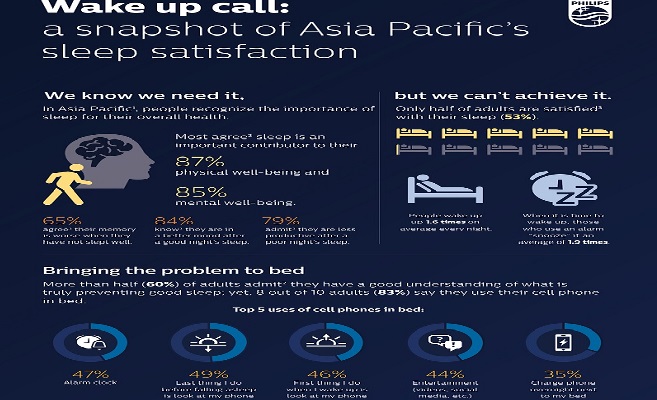
- Global adults barely get the recommended minimum hours of sleep each night, averaging 7.0 hours of sleep per night, down from 7.1 hours in 2019
- Almost half (47%) of adults in Asia-Pacific are not satisfied with their sleep
- Fear and unawareness of sleep conditions could hinder people from seeking treatment
Manila, Philippines – People around the world are now sleeping even lesser each night, with 7.0 hours of sleep per night (vs 7.1 hours in 2019) – 6.8 hours on weekdays (similar to 2019) and 7.5 hours on the weekend (vs 7.9 hours in 2019). This finding was among others announced by Royal Philips (NYSE: PHG, AEX: PHIA), a global leader in health technology, in its 5th annual sleep survey, “Wake Up Call: Global Sleep Satisfaction Trends”. (Information of survey below).
Sleep helps the body redistribute energy resources that are primarily used for brain and muscle work to the immune system1. Clocking in at least seven hours of good night’s sleep on a regular schedule can reduce stress levels and improve overall well-being2.

Good sleep continues to evade many
This year’s results also revealed that getting sufficient sleep remains a challenge for many around the world – whether in Asia Pacific (APAC), the Americas or Europe – with those surveyed averaging just 7.0 hours of sleep per night.
While the quantity of sleep is close to the global average number of hours, sleep satisfaction of adults in the region remains low. Almost half (47%) feel that they are not satisfied with their sleep, and over 1 in 3 (35%) of them believe getting adequate sleep is beyond their control.
Looking at the factors that most inhibit sleep, worry or stress continues to be the top reason (29%), along with one’s sleeping environment including noise, light, and temperature (15%), mobile devices like phones or tablets (13%) and health conditions such as pain or breathing problems (9%).
Mobile addiction causing sleep woes
Half of APAC respondents (49%) say the last thing they do before falling asleep is looking at their phone, higher than 39% of global adults surveyed, and 46% of APAC adults look at their phone as soon as they wake up in the morning (vs 39% of global adults). Around 15% even respond to texts and calls that wake them up through the night, preventing them from getting uninterrupted rest.
Hurdles in seeking treatment or diagnosis
Philips’ global sleep survey found that the fear of the unknown is a limiting factor for people getting diagnosed for sleep conditions, such as obstructive sleep apnea (OSA).
“Although it’s positive that people now see the importance of sleep for overall health, it’s still troubling that many are unable to get a restful night of sleep and not wanting to know that they suffer from OSA,” said Ashwin Chari, country manager, Philips Philippines Inc. “If left untreated, sleep apnea can have serious short- and long-term health risks including heart disease, type 2 diabetes, stroke, and high blood pressure.
In search of a good night’s sleep
Faced with the lack of quality sleep, 66% of APAC adults also say they are interested in recent information and strategies to improve their sleep.
Sleep deficit affects people both mentally and physically, so we need to educate people on sleep resources and empower them with the confidence that their efforts will pay off,” said Mark Aloia, Ph.D., Global Lead for Behavior Change, Sleep & Respiratory Care at Philips.
To learn more about the Global Sleep Survey and Philips’ commitment to improving access to sleep technology worldwide, visit Philips.com/WorldSleepDay.







